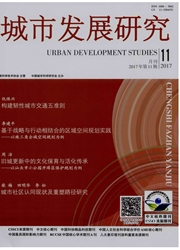

 中文摘要:
中文摘要:
全面拆除重建的老城改造模式在政治、经济、社会和文化层面上都面临困境。超越以拆迁收储为主导的传统模式,探索在整体保护的前提下,以产业升级、环境整治和基础设施改进相结合的老城"微更新"模式。以厦门营平街区为例,分析其改造和规划演变历程,提出以公房引导与私房自主更新相结合的老城区住房产权处理与管理策略。以公房作为政府掌控的空间资源,通过管理和政策机制的改进,腾退公房,通过街区运营机构引导文创产业入驻,激活老城产业活力;以公房改造为契机,塑造街巷内部公共空间,完善街巷网络,通过破墙开店,再造内街骑楼和小广场;以公房置换私房的形式,解决公私有房混杂的问题。研究私房产权处理难点的应对细则,出台鼓励私房翻改建的配套政策。街区整治规划应明确建筑分类分级保护改造策略,应用市场机制激发私房业主自主更新的积极性;出台"居改非"、"平改坡"、设计与改造代理、金融财税扶持政策;引导成立社区自治组织,完善自治规则,规范自主更新管理和运作机制。
 英文摘要:
英文摘要:
Comprehensive removal and reconstruction model of the old city are facing difficulties in the political,economic,social and cultural aspects. It surpasses a traditional mode where remove and storage predominate and explores a " micro-update" mode of the old city through the combination of industrial upgrading,environmental remediation and infrastructure improvement under the premise of the overall protection. Taking Ying Ping block for instance,this paper analyses its evolution process of transformation and planning and puts forward to the housing property management and strategy of the old city under the combination between guided public houses and selfupdate private ones.
 同期刊论文项目
同期刊论文项目
 同项目期刊论文
同项目期刊论文
 期刊信息
期刊信息
